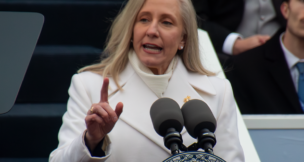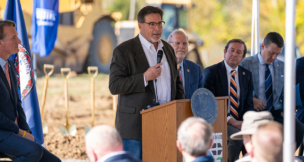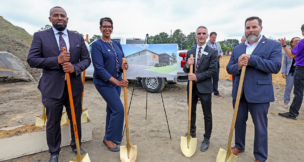2024 Virginia Business Person of the Year: Robert M. Blue
Dominion CEO leads Fortune 500 utility through pivotal change
Kate Andrews //December 2, 2024//

Dominion Energy CEO Bob Blue is leading the Richmond-based Fortune 500 utility through a period of pivotal change, overseeing the modernization and diversification of Virginia’s electric grid to meet challenges such as carbon-free power mandates and fast-growing demand from data centers. Photo by Caroline Martin

Dominion Energy CEO Bob Blue is leading the Richmond-based Fortune 500 utility through a period of pivotal change, overseeing the modernization and diversification of Virginia’s electric grid to meet challenges such as carbon-free power mandates and fast-growing demand from data centers. Photo by Caroline Martin
2024 Virginia Business Person of the Year: Robert M. Blue
Dominion CEO leads Fortune 500 utility through pivotal change
Kate Andrews //December 2, 2024//
Bob Blue has a “no jerks policy,” which he attributes to his upbringing in Albemarle County.
“We don’t always agree. In fact, we shouldn’t agree,” he clarifies. “It doesn’t mean that we all just hold hands and sing ‘Kumbaya,’ but what it does mean is that we should treat each other respectfully.”
As Dominion Energy‘s chair, president and CEO, Blue, 57, sits at the top of a Fortune 500 utility that provides electricity to 2.7 million customers in Virginia and nearly 1 million more in the Carolinas. Dominion also has about 500,000 natural gas customers in South Carolina and operates the Millstone nuclear power plant in Connecticut, which generates power for 2 million homes.
Blue has most of the markers of success one would expect: a large corner office with a beautiful view of the James River, degrees from elite academic institutions, and close connections with powerful and important leaders.
But going back to childhood, he was part of a close-knit family with strong civic and political ideals, as well as deep roots in Albemarle, where his father, Tom, a retired land surveyor who served on the county school board and planning commission, still lives. Blue’s late mother, Jo, was a legislative assistant to Charlottesville-area Democratic state lawmakers.
His parents, Blue says, taught him to show respect to other people, no matter their circumstances, a lesson he carried from his earlier career in state politics to Dominion, where he’s worked since 2005.
Blue’s Dominion is not your father’s VEPCO, though. In 2020, the Virginia General Assembly passed the Virginia Clean Economy Act, setting a 2045 deadline for Dominion to move to carbon-free energy generation — even as the demand for electricity in Virginia is expected to double over the next 15 years thanks to data centers and increasing digital demands. Under Blue’s watch, Dominion has sold off billions of dollars in natural gas assets and started building the $9.8 billion Coastal Virginia Offshore Wind farm off the coast of Virginia Beach, expanded solar energy and battery storage facilities, and taken early steps toward exploring the construction of small modular nuclear reactors.
In recognition of his leadership at Dominion Energy during what may well be the most pivotal moment in the utility’s history, Virginia Business has named Blue its 2024 Business Person of the Year.

Head of the class
Born in 1967, Blue grew up on a small farm off Virginia State Route 20 in northeastern Albemarle County, within walking distance of his grandparents’ home.
As youths, Blue and his older brother, Tom Jr., often got pulled into helping their dad with his surveying work. “He had a very small firm — small meaning his sons would be out cutting brush for him,” Blue says. “That was a weekend or summer activity for us.”
At Albemarle High School, Blue was the 1985 class valedictorian, as well as a member of the debate team and the school’s Teen Democrats club. He stayed close to home for college, attending the University of Virginia.
Every first-year student at U.Va. has an academic adviser, and Blue’s happened to be Larry Sabato, the influential national political analyst who later founded U.Va.’s Center for Politics.
Initially considering an engineering degree, Blue remembers visiting Sabato in his cluttered basement office in fall 1985. “So, I took him my schedule. He goes, ‘This looks boring. You need to take a government class.’ So, I did, and I enjoyed it and ended up majoring in government.”
Blue turned out to be one of Sabato’s best students. “He was just absolutely topflight. His papers were always so well-written, and you know, whatever he said in seminar was worth listening to,” Sabato recalls, thinking back to spring 1988, when Blue was in his government honors program. “I mean, he was just marked for success.”
Blue also immersed himself in real-life politics. He was a post-grad Governors Fellow for Virginia Gov. Gerald L. Baliles, and Sabato recommended Blue as one of a handful of Southern college students to ask a question of the 1988 Democratic presidential primary candidates during a debate in Houston.
Blue’s question is lost to memory, but he recalls addressing it to candidate Jesse Jackson. More memorable was the trip to Houston and a stay at the Four Seasons Hotel, an exciting moment for Blue, who met legendary CBS newsman Walter Cronkite and, more surprisingly, TV star Mr. T, who was also a guest at the hotel.
As a newly minted U.Va. graduate in 1989, Blue joined Gov. Doug Wilder’s historic gubernatorial campaign to become the nation’s first elected Black governor. U.S. Sen. Mark Warner, who had not yet run for office then, managed Wilder’s successful campaign.
“A number of young people from around the nation volunteered to come and work for me and my election, literally for nothing,” Wilder recalls. “We had very little money to pay them in terms of salary. They were very much interested in being a part of uplift and development. And Bob was one of those persons. He was very low-key in terms of style, but very effective. He undertook to engage other young people in the state. We had no directions as to how they were to do it, other than to perform it.”
Wilder has spoken with Blue from time to time over the decades, and he says his former campaign staffer is “low-key still but heavily involved with what’s best for Virginia. I’m very proud of him.”
Siren song of politics
After campaigning for Wilder, Blue in 1991 entered Yale Law School, where he met a fellow law student and his future wife, Liz Appel Blue, who he says is “absolutely” smarter than he is, as well as a “very high-energy, very optimistic person who just gets stuff done.”
Blue was editor-in-chief of the Yale Law and Policy Review in his final year of law school, and he was hired by the Washington, D.C., white-shoe firm Hogan & Hartson (now Hogan Lovells) after clerking for a federal judge in Richmond. In 1995, Warner called Blue to help him in Warner’s first run for U.S. Senate against Republican incumbent U.S. Sen. John Warner.
The battle of the Warners ended with a loss for Mark Warner, but the race was close enough to launch Warner into the state’s governorship, which he won in 2001, becoming the first Democrat to hold the office since Wilder. That’s when Warner again called on Blue, who was then close to making partner at Hogan & Hartson. Instead, Blue moved to Richmond and served as Warner’s counselor and top policy adviser during his 2002-06 gubernatorial term.
Eva Teig Hardy, who met Blue when he was working on the Wilder campaign and was state secretary of Health and Human Resources under Baliles, recalls Blue as a serious young man who “thought a lot before he said anything; very smart [and] a little bit aloof until you got to know him.”
Warner says he could count on Blue to be “very organized, and people who worked for him were loyal to him. He was never into the kind of backbiting … that can sometimes screw up an office, particularly in political campaigns or political offices. He was about doing the job.”
Although negotiating with state Republicans in the legislative majority was a big part of that job, Blue also investigated the case of Roger Coleman, a convicted killer and rapist who was executed in Virginia in 1992 but whose guilt was publicly questioned. Even the pope tried to intervene, Warner remembers. In 2006, with a couple of days left in his gubernatorial term, Warner gave the OK for Coleman’s DNA to be retested against evidence. In the end, Coleman’s DNA matched, confirming his guilt.
“This was where I think I saw Bob’s character in a real way,” Warner says. “He spent tons of time looking at this and thinking, ‘If you’re going to be willing to carry out our death sentence, it’s the obligation of the state, even after the fact, to go ahead and pursue evidence.’ No one lived the ups and downs and intellectual challenges, emotional challenges, legal issues more than Bob.”
A new job
In 2005, as Warner’s term was ending, Blue made the jump to Dominion, where he found himself working for his old friend and colleague, Hardy, who was Dominion’s executive vice president for state affairs and corporate public policy and wanted to retire. But her boss at the time, Dominion CEO Tom Farrell, wanted her to slow her roll.
“Tom Farrell said to me, ‘You’re not going until you get somebody in here for three years.’ He said he wanted somebody to work with me before I left for more than just a few months,” Hardy says.
With that stipulation in place, Hardy hired Blue as managing director for state affairs, which brought Blue back into contact with Virginia legislators, as well as an array of federal authorities, although with a different objective.
Hardy remembers showing Blue the ropes of his new job.
“You have to work with Republicans, you have to work with Democrats. You can’t be one-sided in your approach, because we have customers that are both,” she says. “We have to know what’s coming five, 10 years from now and be able to explain to both our customers and the regulators and legislators.”
After Hardy’s retirement, Blue became Dominion’s vice president of state and federal affairs, which started his steady ascent up the corporate ladder. After a series of positions overseeing public policy, communications, regulations, energy solutions, policy and law, he became president of Dominion Virginia Power. In December 2019, he became co-chief operating officer of Dominion Energy, and in October 2020, Blue succeeded Farrell as president and CEO.
Farrell remained the utility’s executive board chairman, but only a few people knew about his grave cancer diagnosis, which claimed Farrell’s life in April 2021, one day after Blue succeeded him as chairman.
“It wasn’t easy,” Blue says of Farrell’s death. “But I had the benefit of having worked for Tom directly. For a lot of the time that I’ve been at Dominion, I [reported] directly to Tom, so I had the benefit of at least observing someone who was such a great leader for our company and in our industry.”
On paper, Blue and Farrell have many similarities: They were both lawyers, both U.Va. graduates and members of the university’s board of visitors, and both rose through corporate ranks to the top of Dominion.
But as CEO, Farrell was a more public presence than Blue, especially in Richmond, where Farrell made headlines for his political and civic involvement — or, as some critics then saw it, meddling — as a vocal booster for the failed Navy Hill downtown redevelopment project, and by leading renovations of the Altria Theater and a performing arts center.
Blue, on the other hand, has been a quieter leader.
Dominion’s senior vice president of corporate affairs and communications, Bill Murray, has known Blue since Warner’s term as governor and says Blue reminds him of a World War II figure, U.S. Navy Adm. Raymond Spruance. He, too, was a “very reserved” leader who stayed calm even during battle and worked well with the “larger-than-life figure” of Adm. Bull Halsey. “Two completely different leadership styles,” Murray points out.
Blue might be best known for his habit of commuting via kayak on the James River from his home to his downtown office. It’s not a daily occurrence, he notes, because he can’t row back up the rapids and has to arrange for a ride from his wife, but Blue is indeed an avid outdoorsman who enjoys paddleboarding, biking, snow skiing and whitewater rafting.
State and federal lobbyist David Hallock, a longtime friend, says he bonded with Blue over their mutual love of U.Va. men’s basketball, adding that Blue has “an encyclopedic memory for U.Va. stats and players and remembers every game — and part of that’s [from] growing up in Charlottesville.”
As empty nesters, with two sons and a daughter grown and out of the house, Blue and his wife also travel a fair amount and spend time with their two dogs, Patty and Lemon.

Nuclear exploration
These days when Blue’s name is in the news, he’s often talking about nuclear energy.
At a July event with Gov. Glenn Youngkin at Dominion’s North Anna nuclear power station, Blue called himself “a cheerleader for nuclear. It’s reliable, it’s affordable, and it’s clean.”
Nuclear energy is also necessary for Dominion to meet the Virginia Clean Economy Act’s 2045 carbon-free energy deadline, Blue contends. Youngkin, too, has emphasized nuclear exploration as a crucial segment of his recommended “all-of-the-above” approach to meeting the commonwealth’s energy demands.
In October, Amazon Web Services and Dominion officials announced the companies were jointly exploring the financing and development of potential SMRs in Virginia.
Despite growing momentum behind nuclear, wind and solar energy, Dominion officials also must contend with some disagreements and protests. For example, community group Friends of Chesterfield has organized opposition against Dominion’s planned new natural gas plant in the county. It would be built on a retired coal plant property where 15 million yards of coal ash sat in two ponds until 2019, when the state legislature mandated its removal.
“The same neighbors who have endured almost 80 years of coal pollution still face the prospect of an additional 30 to 40 years of toxic emissions from this dirty gas plant,” says Friends of Chesterfield.
But Dominion officials have said that the gas plant in Chesterfield will run only intermittently as a “peaker plant,” basically as a backup source amid peak energy demands during the hottest and coldest times of the year.
“We are telling you that for the next 15 years, we’re going to need to be able to generate [energy] using natural gas in order to keep the system reliable,” Blue said during an October press scrum. “Will it be operating off of hydrogen, will it be doing something different by 2045? I can’t answer that question sitting here today.”
Another point of contention, this one longstanding, is Dominion’s outsize political influence, in particular its donations to politicians on both sides of the aisle in Virginia’s legislature.
In 2018, wealthy Charlottesville investor Michael Bills founded Clean Virginia, a PAC that offers funding to Virginia legislators who decline to take donations from Dominion or own the utility’s stock. Some Democrats have taken Bills up on his offer, and he donated a total of $12.5 million in the 2022-23 campaign cycle, but most Republican lawmakers and some Democrats still accept Dominion’s money, which amounted to about $12 million over the past decade.
Bills started the PAC because he felt Dominion had too much sway over lawmakers, many of whom had received donations from the utilities for years, even decades. “It was legal — corrupt, morally wrong, repugnant, but legal,” Bills said in a 2023 Washington Post interview. “You kind of realize that’s not the system that we should have.”
Dominion issued a statement to the Post, noting that its political contributions are public and “transparent,” and Blue says Dominion will remain politically involved.
“As our state has grown — a state that is No. 1 for business in the country because of very smart decisions made by policymakers of both parties — we’re a really important part of that, and so we need to be in the conversation,” he says. “People participate in different ways, but our company participates in the exact same way today that it did when I started here.”
Still, circumstances and priorities — other than the basics of reliable power and affordable rates for customers — can change over time, Blue allows.
Under Farrell, the Atlantic Coast Pipeline — a joint venture between Dominion and Duke Energy — was a high priority for the company, seeking to funnel natural gas across Virginia and North Carolina. In July 2020, the project was called off.
“Fundamentally, it was a matter of economics,” Blue says. “The permitting process was taking so long, in part because of court decisions that were remanding permits back to agencies to do more work … [that] it didn’t make sense from an economic perspective for the company to continue with that project.”
And in subsequent years, under Blue, Dominion has sold off multiple natural gas holdings, decreasing its debt and freeing up money for other projects, such as purchasing two more offshore wind leases off Virginia and North Carolina’s coasts that can be used one day to build more offshore wind turbines.
Blue can’t predict the future, but he views renewable and carbon-free power sources — including nuclear — as a vital part of it for Dominion. So will be meeting higher energy demands as more data centers are built in the commonwealth.
For perspective, Blue can look back to his childhood home in Albemarle, where he saw firsthand the rapid growth in power demand from consumers in homes with a host of then-new modern amenities.
“It was a ranch house built in the year I was born, 1967, and it had electric appliances and electric baseboard, electric heat,” he says. “Electric demand went up at a pretty significant rate. We’re going to be going up again.”













